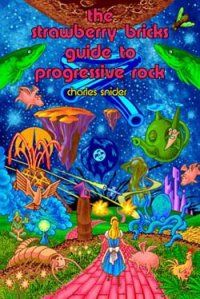A prog perk of living in Atlanta is getting to know the approachable members of Mastodon. They are a shaggy, friendly, musical bunch. The band spent most of the summer on the road, including a stop in Moscow. But there’s always time for the hometown, it seems, and here’s a good example:
Here’s a fascinating and seemingly endless discussion: What is prog? The Strawberry Bricks Guide to Progressive Rock has its own criteria: “Extended composition, virtuosity in execution, which form the binding aspect: music that demands the attention of the listener.” No mention of improvisation there. And it’s aimed strictly at music. Still, not a bad jumping off place.
This book, by the way, is a great intro to this style of music. Here’s one recommendation from a page opened at random: Hatfield and the North, The Rotters Club, March 1975.
Lastfm streams it for free here. Enjoy, and remember when music used to cost something. Those might have been the days.
The Strawberry Bricks Guide stops its listing of prog must-haves at 1979. Beyond this Golden Age lay plenty more must-haves. Put Cream’s 2005 reunion shows on the list. The dirty secret about Cream is that it’s a jazz band with lashes of prog. Hope that doesn’t take the fun out of it. This reunion was a bold and mature approach to old material that sounded old in the late ’60s. The result is magnificent. This band, which always sounded great, was even better on this round of dates. The pace is slower, the songs getting some needed makeovers. Here’s an example:
Gong, surely one of the most Euro-centric of prog bands, has recently released some early ’70s frolicking in their backyard in France. Take a look at this video from the newly released collection. Now THESE are lawn seats.
Trey Anastasio has been extremely quiet about his drug bust of several years ago, and the rehab and court appearances he went through to get clean. He went public this week to promote the merits of the program he went through to get his life back. It’s reassuring to see someone willing and able to do the right thing.
Yes, this blog considers bicycle riding prog. What’s not prog is the policy surrounding bicycle policy in the United States. For instance, this study should prompt movement on this issue forward. It probably won’t, but everyone should be aware of the potential impact. This is proggy because it would represent progress.
Speaking of proggy policy, here’s a recent item from Al Gore that appeared in Rolling Stone. An excellent read and you can catch every word here. Best quote:
“After World War II, a philosopher studying the impact of organized propaganda on the quality of democratic debate wrote, ‘The conversion of all questions of truth into questions of power has attacked the very heart of the distinction between true and false.'”
Right. Make up your own mind and don’t let anyone else do it for you.
Pitchfork recently posted a list 60 great music books. It’s an excellent list and there’s a summary for each. Read about all 60 here. Crying out for re-publishing is Julian Cope’s Krautrocksampler. This highly regarded book needs to be back in print.

